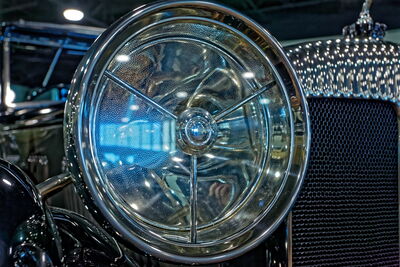Large(r) Format
Jan 11, 2019 13:02:37 #
The trend seems to be smaller and Mirrorless cameras with full size high megapixel sensors. I am wondering if those of you who shoot larger format digital cameras, if you did not already shoot larger format would you consider making that change now? With 36, 45 and 50 mp cameras at full size, are there advantages to going to a larger sensor? Ie with a larger format and 50 mp are the pixels larger and deliver better low light performance? More detail and sharpness.
Jan 11, 2019 13:15:55 #
For me it is like trying to imagine what 5 billion dollars in cash would look like. I have a 46mp Nikon D850. The detail/sharpness is absolutely incredible. Much more so than with any slide film I ever used. I can't imagine what more pixels on a 35mm format sensor would look like.
Will there be more mp cameras coming out? Almost certainly. Do I need one. Can't see why.
Will there be more mp cameras coming out? Almost certainly. Do I need one. Can't see why.
Jan 11, 2019 13:17:01 #
if I could, I'd go large. But clearly these types of cameras are out of my price range and are too heavy for me to carry. IMO is that I wish manufactures would create a single mirrorless camera with multiple sensors. offering a beginner camera with a 24mp sensor then later allowing that person to upgrade the sensor but keep the camera body and lenses. So let's suppose that I had kept that old Nikon D50, then I learn they have upgrades for the camera which would allow me to use the same camera body but upgrade the sensor. One would start with a 24MP then could gradually increase to 36 45 50 etc based on an upgrade type price.
Jan 11, 2019 13:24:40 #
John Howard wrote:
The trend seems to be smaller and Mirrorless cameras with full size high megapixel sensors. I am wondering if those of you who shoot larger format digital cameras, if you did not already shoot larger format would you consider making that change now? With 36, 45 and 50 mp cameras at full size, are there advantages to going to a larger sensor? Ie with a larger format and 50 mp are the pixels larger and deliver better low light performance? More detail and sharpness.
(Yawn.)
There are advantages and disadvantages to everything. Life is full of little trade-offs.
There is a point at which you buy and dig into a system, and rent the gear you DON'T have, only when you need it. Each of us must decide what fits our needs most often, most flexibly, and go with that.
I used to use full frame 70mm long roll, 6x9, 6x7, 6x4.5, and 46mm long roll film for various purposes. I occasionally did some product or still life work with a 4x5. My go-to camera was always a Nikon FTn or F3 back then. The other stuff only became needed when I had a special use for it.
These days, my go-to camera is a Micro 4/3 (Lumix DMC-GH4). It does what I need to do with it, which is a mix of video and stills, 95% of which will be on Intranets, DVDs, Blu-Rays, and protected sites on the Internet.
So... I don't own a full frame, or an APS-C, or a medium format digital camera. (I'd probably pull out my old Bronica ETRSi and buy some film for an occasional large print need, although I've taken Micro 4/3 to 40x30 inches with no complaints.)
I may need to rent a camera with ultra high resolution when making HUGE prints that will be viewed from ridiculously close distances, or when I must crop way into an image because my lens isn't long enough. MAYBE I'd rent one for shallow depth of field, but I would rather rent one of the four f/0.95 Voigtlander lenses if it can work for that.
There is always a law of diminishing marginal returns... In photography, the LoDMR is favoring smaller and smaller sensors for general use. Bigger sensors are getting better, too, but they're far less necessary than they once were.
http://dedpxl.com/crop-or-crap-math-or-moment/
https://www.youtube.com/watch?v=PHYidejT3KY&t=634s (He starts talking at 0:19.)
Jan 11, 2019 15:54:16 #
All things being equal
Bigger formats should produce higher quality photographs
I've seen them & I love to look at them --
Then at least for me reality sets-in --- Whatever you purchase you must carry - Remember your mother had small children -- How much can you afford to pay remembering that this is a hobby not a business
Eventually you realize that smaller can be better for you
Bigger formats should produce higher quality photographs
I've seen them & I love to look at them --
Then at least for me reality sets-in --- Whatever you purchase you must carry - Remember your mother had small children -- How much can you afford to pay remembering that this is a hobby not a business
Eventually you realize that smaller can be better for you
Jan 12, 2019 09:51:46 #
cameraf4 wrote:
For me it is like trying to imagine what 5 billion dollars in cash would look like. I have a 46mp Nikon D850. The detail/sharpness is absolutely incredible. Much more so than with any slide film I ever used. I can't imagine what more pixels on a 35mm format sensor would look like.
Will there be more mp cameras coming out? Almost certainly. Do I need one. Can't see why.
Will there be more mp cameras coming out? Almost certainly. Do I need one. Can't see why.
Exactly why I was wondering if 50mp on a 35mm sensor is as good as 50mp on a large format sensor.
Jan 12, 2019 10:10:10 #
John Howard wrote:
Exactly why I was wondering if 50mp on a 35mm sensor is as good as 50mp on a large format sensor.
All other things being equal, the larger format sensor with the same MP count will perform better in low light. It will gather more photons per sensel. That should mean better color depth and dynamic range, too.
Jan 12, 2019 12:23:02 #
burkphoto wrote:
All other things being equal, the larger format sensor with the same MP count will perform better in low light. It will gather more photons per sensel. That should mean better color depth and dynamic range, too.
This really should be the last & final word on the subject of Formats --
Be they Small vs Large & everything in between.
However --
Since this subject comes up over & over -- just spend a few minutes of your time & check-out our countries Civil War photos & ask yourselves -- Why these 160 plus year old photos look so damn good???
No Pixels
No Film -- They used Glass plates - both wet & dry
ISO/ASA -- Have been told somewhere between 12 & 8
Lenses - Whatever they were using it was a good 40/50 years before Zeiss & Schott Glass
Those photos look good because a photographer knew what he/she was doing plus their ancient cameras had Very large FORMATS
Jan 12, 2019 15:58:02 #
John Howard wrote:
Exactly why I was wondering if 50mp on a 35mm sensor is as good as 50mp on a large format sensor.
Since there are "documented" advantages with Full Frame (35mm format) sensors over APS-C sized sensors, I think I would bet-the-farm that a 50mp imaging sensor in Large Format should show an improvement over a 50mp sensor FROM THE SAME MANUFACTURER in 35mm format. My question is: would I be able to lug the bigger camera (and its lenses) around on a photo vacation?
Jan 12, 2019 16:30:30 #
John Howard wrote:
The trend seems to be smaller and Mirrorless cameras with full size high megapixel sensors. I am wondering if those of you who shoot larger format digital cameras, if you did not already shoot larger format would you consider making that change now? With 36, 45 and 50 mp cameras at full size, are there advantages to going to a larger sensor? Ie with a larger format and 50 mp are the pixels larger and deliver better low light performance? More detail and sharpness.
Pixel density is finite. You can only pack so many pixels into an itty-bitty sensor.
(And it takes three physical photocells to make one color pixel!).
Optical resolution is finite (limited by a circle-of-confusion cauesd by aberrations and in all cases by an Airy disk)
You can't get blood out of a turnip and you can only get so much resolution out of a 2/3" sensor.
It's really the same game as film -- just more expensive and vastly more complex. But a roll of high-res medium
speed B&W film costs $7 but you can only buy a B&W (hir-res, high dyanmic range, low noise) monochrome
sensor from Leica (the M9 Monochrome) for $8000.
A sheet of 8" x 10" film costs about $5, but large format digital cameras do not exist in the photography market
the largest available digital cameras are medium format -- equivalent to 120 film and cost $5000 and up.
And of course, these is no way to directly compare digital cameras, since you can't pull the sensor out of one
and load it into another. With film, you loaded your favorite film into a new camera and could try it out,
comparing apples to apples.
While digital cameras offer vastly lower resolution than large format film cameras, and all are lower dyanmic range
than B&W negative film, they do offer much shorter battery life mean-time-before-failure.
The average lifespan of a digital camera seems to be about 3-5 years. The average lifespan of a film camera seems
to be about 30 - 50 years. A few film cameras have gone up in value -- no diigtal camera ever has.
Just remember: while optics and electronics have limits, marketing and advertising know no limits!
Jan 13, 2019 08:01:18 #
ken_stern wrote:
This really should be the last & final word on... (show quote)
You may want to add that in addition to using glass wet plate negatives and contact prints, they also used black lacquer-coated tin (tintype or ferrotype), and these were direct positives - no negatives or enlarging process - so, like glass plates, there was no magnifying an image, so no magnifying of defects like poor focusing, grain etc.
Most cameras used either pinholes or simple primitive, uncoated optics.
FWIW - Zeiss' business was telescopes, microscopes and camera (still and moving picture) related optics. Schott, which was formed about 45 yrs later, focused on industrial, domestic, architectural, eyeglasses, coatings, crystal, etc - to my knowledge they did not make lenses, but they did (and still do) make camera filters. You can say that Schott is/was loosely analogous to Corning.
Jan 13, 2019 08:07:48 #
John Howard wrote:
The trend seems to be smaller and Mirrorless cameras with full size high megapixel sensors. I am wondering if those of you who shoot larger format digital cameras, if you did not already shoot larger format would you consider making that change now? With 36, 45 and 50 mp cameras at full size, are there advantages to going to a larger sensor? Ie with a larger format and 50 mp are the pixels larger and deliver better low light performance? More detail and sharpness.
No! I only used the FF but if I used other sizes I would not upgrade. I think upgrading from smaller format is not wise. If you want whatever format you should use that format from start. I decided that I want the digital camera to have the same size sensor as my film camera so I never bought any digital until after Nikon made their FX cameras.
I don't really care what size that much but I want to keep using the same size like I have been using for more than 40 years. I chose the 35mm more than 40 years ago and I stay with it.
Jan 13, 2019 10:43:26 #
cameraf4 wrote:
Since there are "documented" advantages with Full Frame (35mm format) sensors over APS-C sized sensors, I think I would bet-the-farm that a 50mp imaging sensor in Large Format should show an improvement over a 50mp sensor FROM THE SAME MANUFACTURER in 35mm format. My question is: would I be able to lug the bigger camera (and its lenses) around on a photo vacation?



Jan 13, 2019 11:53:33 #
BebuLamar wrote:
No! I only used the FF but if I used other sizes I... (show quote)
Happy to see I was not the only one ---
My path to my 1st Digital Camera was similar to yours - The majority of my Canon lenses were purchased when I shot slide film -- Since I did not want to compromise their angle of view I held off purchasing a digital camera until late 2009 with the 5D MkII --
Jan 13, 2019 13:51:38 #
John Howard wrote:
Exactly why I was wondering if 50mp on a 35mm
sensor is as good as 50mp on a large format sensor.
Exactly why I was wondering if 50mp on a 35mm
sensor is as good as 50mp on a large format sensor.
Sometimes yes, sometimes no. Thaz the WHOLE story.
None of this actually matters. Keep calm and carry on.
.
If you want to reply, then register here. Registration is free and your account is created instantly, so you can post right away.





